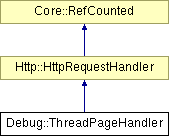Debug::ThreadPageHandler Class Reference
#include <threadpagehandler.h>
Inheritance diagram for Debug::ThreadPageHandler:

Detailed Description
Displays info about currently running Nebula3 threads.(C) 2008 Radon Labs GmbH
Public Member Functions | |
| ThreadPageHandler () | |
| constructor | |
| virtual void | HandleRequest (const Ptr< Http::HttpRequest > &request) |
| handle a http request, the handler is expected to fill the content stream with response data | |
| const Util::String & | GetName () const |
| get a human readable name of the request handler | |
| const Util::String & | GetDesc () const |
| get a human readable description of the request handler | |
| const Util::String & | GetRootLocation () const |
| get a resource location path which is accepted by the handler (e.g. "/display") | |
| int | GetRefCount () const |
| get the current refcount | |
| void | AddRef () |
| increment refcount by one | |
| void | Release () |
| decrement refcount and destroy object if refcount is zero | |
| bool | IsInstanceOf (const Rtti &rtti) const |
| return true if this object is instance of given class | |
| bool | IsInstanceOf (const Util::String &className) const |
| return true if this object is instance of given class by string | |
| bool | IsInstanceOf (const Util::FourCC &classFourCC) const |
| return true if this object is instance of given class by fourcc | |
| bool | IsA (const Rtti &rtti) const |
| return true if this object is instance of given class, or a derived class | |
| bool | IsA (const Util::String &rttiName) const |
| return true if this object is instance of given class, or a derived class, by string | |
| bool | IsA (const Util::FourCC &rttiFourCC) const |
| return true if this object is instance of given class, or a derived class, by fourcc | |
| const Util::String & | GetClassName () const |
| get the class name | |
| Util::FourCC | GetClassFourCC () const |
| get the class FourCC code | |
Static Public Member Functions | |
| static void | DumpRefCountingLeaks () |
| dump refcounting leaks, call at end of application (NEBULA3_DEBUG builds only!) | |
Protected Member Functions | |
| void | HandlePendingRequests () |
| handle all pending requests, called by local-thread's HttpServerProxy | |
| void | PutRequest (const Ptr< HttpRequest > &httpRequest) |
| put a request to the pending queue, called by HttpServer thread | |
| void | SetName (const Util::String &n) |
| set human readable name of the request handler | |
| void | SetDesc (const Util::String &d) |
| set human readable description | |
| void | SetRootLocation (const Util::String &l) |
| set the root location of the request handler | |
Member Function Documentation
| void Http::HttpRequestHandler::HandlePendingRequests | ( | ) | [protected, inherited] |
handle all pending requests, called by local-thread's HttpServerProxy
Handle all pending http requests in the pending queue. This method must be called frequently from the thread which created this request handler.
| void Http::HttpRequestHandler::PutRequest | ( | const Ptr< HttpRequest > & | httpRequest | ) | [protected, inherited] |
put a request to the pending queue, called by HttpServer thread
Put a http request into the request handlers message queue. This method is meant to be called from another thread.
| int Core::RefCounted::GetRefCount | ( | ) | const [inline, inherited] |
get the current refcount
Return the current refcount of the object.
| void Core::RefCounted::AddRef | ( | ) | [inline, inherited] |
increment refcount by one
Increment the refcount of the object.
| void Core::RefCounted::Release | ( | ) | [inline, inherited] |
decrement refcount and destroy object if refcount is zero
Decrement the refcount and destroy object if refcount is zero.
| const Util::String & Core::RefCounted::GetClassName | ( | ) | const [inline, inherited] |
get the class name
Get the class name of the object.
| Util::FourCC Core::RefCounted::GetClassFourCC | ( | ) | const [inline, inherited] |
get the class FourCC code
Get the class FourCC of the object.
| void Core::RefCounted::DumpRefCountingLeaks | ( | ) | [static, inherited] |
dump refcounting leaks, call at end of application (NEBULA3_DEBUG builds only!)
This method should be called as the very last before an application exits.